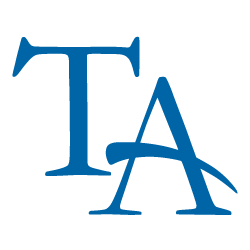Rest

Sleep is a fundamental pillar of overall health, particularly in childhood and early adolescence. It is essential for physical well-being, cognitive development, emotional regulation, and academic success. Quality sleep fosters growth by optimizing brain function, strengthening the immune system, enhancing attention, and promoting emotional resilience. Conversely, sleep deprivation has been linked to serious health conditions, including cardiovascular disease, hypertension, autoimmune disorders, and even certain cancers. Prioritizing adequate rest reduces these risks, supporting long-term health, sustained energy levels, and emotional stability.
Beyond its physiological benefits, sleep is crucial for cognitive development. It facilitates memory consolidation, information processing, and problem-solving, which are critical functions for children acquiring and applying new knowledge. Well-rested children demonstrate sharper focus, stronger decision-making skills, and improved impulse control, which, in turn, helps mitigate negative behaviors. Academically, sufficient sleep is essential for retaining learned material and applying it effectively in class. Sleep enhances a child’s capacity for learning by promoting neural connections that support understanding, creativity, and the ability to perform well on academic tasks. Researchers also estimate with high probability that many children suffering from sleep disorders are treated with medication for ADHD due to a misdiagnosis, highlighting the significant impact that sleep disturbances can have on a child’s overall well-being.
Sleep also plays a vital role in emotional well-being. Children who consistently get sufficient rest are more likely to exhibit emotional stability, a positive outlook, and resilience. Deep sleep, in particular, is crucial for mental and emotional health, as it allows the brain to eliminate toxins, reinforce cognitive function, and clear unnecessary information. This process helps prevent neurodegenerative diseases later in life. Additionally, dreaming serves an essential function in emotional regulation, aiding in problem-solving, processing daily experiences, and reinforcing learning, all of which contribute to overall psychological well-being.
Recommendations for Improving Sleep
Avoid Sugar and Caffeine - Establish a Consistent Routine
Limit Screen Time - Dim the Lights
Early Bedtime - Physical Activity
Create an Ideal Sleep Environment - Pre-bedtime Preparations
Talk Through Problems Before Bed - Prioritize Sleep Over Late-Night Work
Speech/Language Therapy
Communication is a skill that you can learn. It’s like riding a bicycle or typing. It takes time and practice, over and over. But if you're willing to work at it, you can rapidly improve.
— Brian Tracy

Your child’s capacity to understand and use language effectively depends on his or her ability to clearly produce meaningful speech. Speech is a critical skill in human development and one which can require additional practice and work for some children to master.
To help ensure our youngest students are set up for long-term speech and communication success, some Thales Academy campuses offer speech/language evaluations at no cost for all students in grades K–3 (Families may choose to opt out of this if desired). The preliminary measurement of these skills is obtained with a speech/language screening—a verbally administered assessment using pictures. The purpose of screening is to identify children who would benefit from speech/language therapy. After screening, parents/guardians will receive written notification only if speech errors are noted. All previously screened students with documented errors will be rescreened.
Families who opt for additional speech/language therapy for their child must cover the cost of the speech therapist and pay the speech therapist directly, but our schools will work with parents/guardians to schedule time as possible for such therapy to take place during school hours if desired (outside of core class time to avoid students falling behind in their key classes).
Your campus Head of School may be able to recommend a speech/language therapist, or families may request another speech/language therapist of their choice. All speech/language therapists working on Thales Academy school grounds must pass a Thales Academy background check and be approved by the campus Head of School. For more information, please contact your campus Head of School.
Fine Motor Skills

Writing, to me, is simply
thinking through my fingers.
— Isaac Asimov
Fine motor skills involve the precise movement of small muscles in the hands and fingers. They are needed for everyday tasks like holding a pencil, buttoning a shirt, turning a doorknob, and folding laundry. In school, strong fine motor skills support neat handwriting, cutting with scissors, and arranging small objects.
Pencil Grasp Matters
How a child holds a pencil greatly affects their writing. Correcting pencil grasp early is important to prevent fatigue, strain, and sloppy handwriting as writing tasks increase. Encourage your child to hold the pencil correctly, and provide regular reminders as they build hand and finger strength.
Immature Grasps
Ways of holding the pencil that should be corrected over time to improve hand health and penmanship.
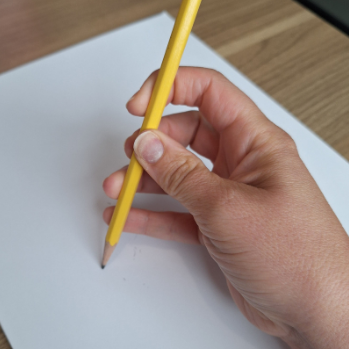
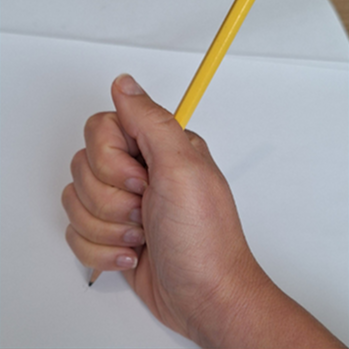
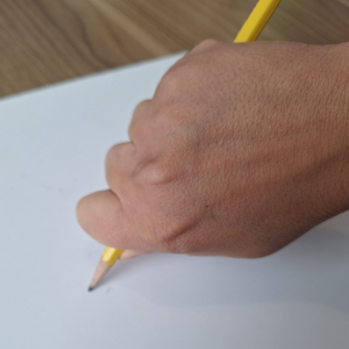

Mature Grasps
Ways of holding the pencil that promote the healthiest hands and the neatest handwriting.

Quadropod Grasp
An early mature grasp. There may be less dexterity, and the student should work on strengthening his or her fine motor skills.
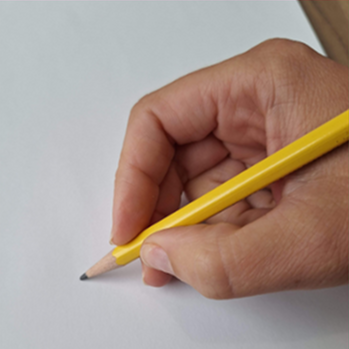
Tripod Grasp
Allows the most freedom and dexterity of movement (and is considered the ideal grasp).
Fine Motor Practice
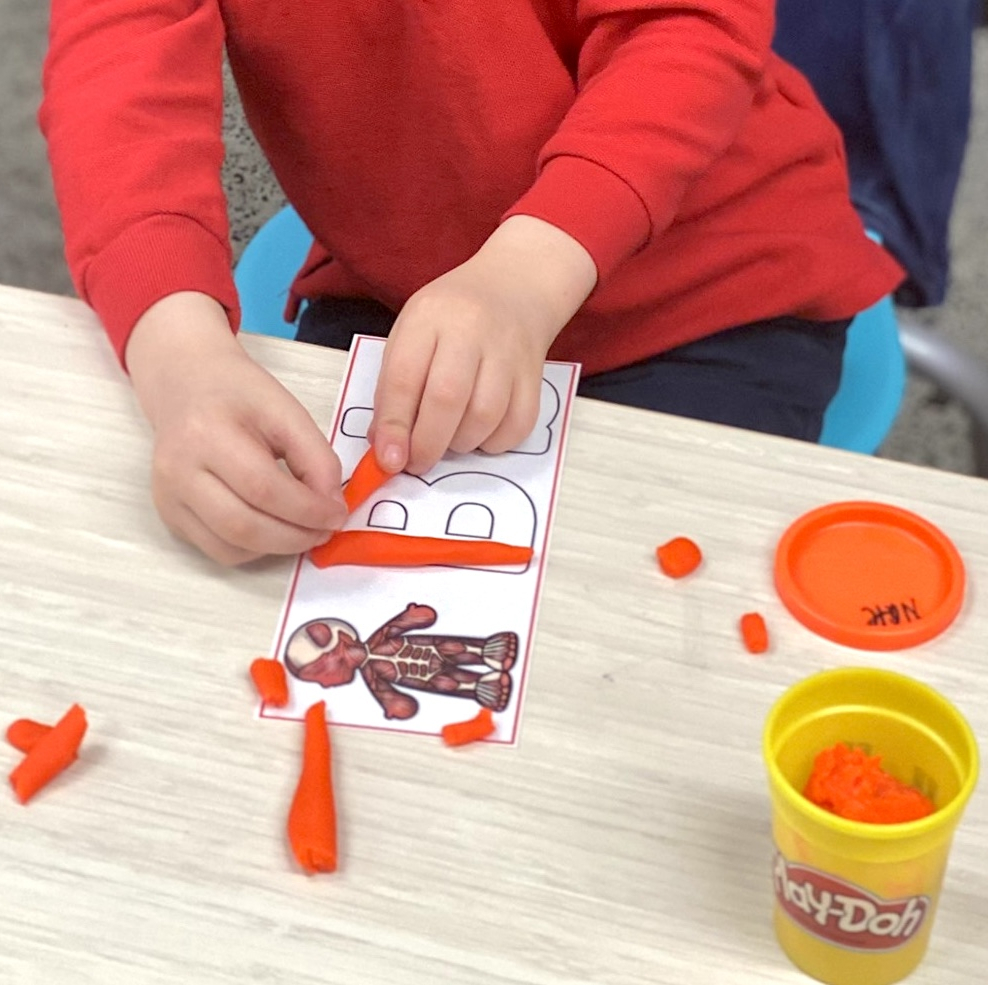
Practice at Home
While school will continue to support fine motor development, practice at home is essential. Activities should be fun and strengthen hand and finger muscles:
- Playdough and Clay: Roll, shape, or hide small objects to strengthen hands and fingers.
- Crafts: Use scissors, string beads, glue small items, tear paper, or use hole punchers. These activities improve coordination, hand-eye control, and dexterity.
- Games: Playing with small pieces or tools like tongs helps build finger strength. Recommended games: Trouble, Hi Ho Cherry-O, Sneaky Snacky Squirrel, Connect 4, Light Bright, Jenga, Legos.
- Drawing and Writing: Encourage coloring, scribbling, and writing with crayons, markers, chalk, or pencils (avoid tablets). Use short crayons or broken chalk to promote proper pencil grasp. Activities: sidewalk chalk, coloring books, mazes, free drawing, simple "how-to-draw" books.
Your support at home helps your child develop the skills needed for school and everyday life. Use the activities above and resources below to make fine motor practice fun and effective.
Handwriting Resources
Cutting & Lacing Activity PagesParent Fine Motor Support Amazon List
Fine Motor Skills Handout
Expectations

Well done is better than well said.
— Benjamin Franklin
To help our students develop to their highest potential is at the heart of our mission at Thales Academy, and high expectations are part of how we nurture such development. We set clear expectations for our students to encourage habits for success, nurture self-discipline, and maintain a superior learning environment. When a student receives support from home in helping meet these expectations, there is a much greater chance he or she will achieve his or her highest potential.
Attendance

If you are early, you are on time.
If you are on time, you are late.
The habit of showing up early—for class, practice, a meeting, the school day, work—demonstrates respect for everyone else's time.
Our curriculum is detailed and fast-paced at Thales Academy, so even one part of a class missed can put a student behind. Thus, to help our students find success, we are strict on attendance at Thales Academy.

Teach your child that success starts with showing up by helping them arrive early, attend every day, and stay all day. Furthermore, set the example yourself–don’t make excuses or condone skipping school. Limit absences to sickness, family emergencies, and bereavement leave, and try to schedule appointments outside of the school day or over track out.
Regular school attendance is of paramount importance in the educational process. A pattern of absenteeism and/or tardiness can rapidly have a significant, negative impact on a student's ability to learn and grow. In order to achieve optimal student outcomes, and accounting for the central role daily attendance plays in the cumulative curriculum at Thales Academy, the Thales Academy Board of Directors has established our attendance policy in alignment with state compulsory school attendance laws.
Attendance Policy

Any of these instances will cause a student’s enrollment to be placed under review, and the student may be subject to removal from Thales Academy if these limits are exceeded:
Per School Year:
- 5 Unexcused Absences
- 10 Total Absences (of any type)
- 12 Tardies/Early Departures
When a student reaches any of the three benchmarks listed above, the student's enrollment will be placed under review. An attendance contract will be issued as part of the review (see Attendance Contract Template below).
Failure to adhere to the contract will result in the student's enrollment being terminated.
2025–2026 Attendance Contract TemplateNotes:
- Excused Absences are granted ONLY for documented illness, injury, or death in the immediate family. Written documentation in the form of a doctor's note or a note from the student's parent/guardian must be submitted to the Office Manager within 24-hours of the absence to count as an excused absence. We highly recommend getting a doctor’s note whenever possible.
- All other absences will be counted as Unexcused Absences (including any absences that could be defined as excused but lack the required written documentation submitted to the Office Manager within 24-hours of the absence). Suspensions are also counted as unexcused absences.
- Tardies/early departures will be counted in total regardless of reason, with no excused or unexcused differentiation.
- Students will be marked tardy if they are not inside the building by the end of the morning carpool time listed on the campus bell schedule.

Additional Notes:
- Absences should be reserved for medical emergencies, sickness, or death in the immediate family.
- Families should use the four track outs during the year to schedule non-urgent medical appointments, vacations, trips, and celebrations.
- Family vacations, travel, educational enrichment activities, sports programs, or any other non-school-related activity during the academic year, including religious observances and scheduled non-urgent medical appointments (doctor checkups, dentist appointments, etc.) are all considered unexcused absences.
- The Head of School may, but is not obligated to, provide a one-time excessive absenteeism exception in the instance of a documented case of illness if the student has satisfactorily maintained their work for the duration of the absence.
Make-Up Work Policies

- Due to Excused Absences: Students have one day for each day absent to complete missed work (not counting weekends).
- Due to Unexcused Absences: Students are expected to keep up with missed assignments and return to school with work completed.
Pre-K–5
Families must inform each teacher in advance and collect any missed work. All work is due immediately upon the student’s return.
JH/HS
Families must inform each teacher in advance and collect any missed work that is available from each teacher. If the work is not available in advance, the student is responsible to check Canvas and email his/her teachers about what work was missed. All work is due immediately upon the student’s return.
- Excessive Tardies/Early Departures in Same Class: 7 tardies or early departures in the same class in a semester will remove the privilege for a student to make up work missed due to future tardies or early departures in that class unless an exception is approved for documented medical reasons by the Head of School.
FAQ

Why does this strict attendance policy exist?
At Thales Academy, our attendance policy is designed to support academic consistency and uphold the classical values of responsibility, integrity, and respect for one’s commitments. Frequent absences disrupt student learning and place added strain on teachers, staff, and students.
How will I be alerted to potential attendance threshold issues prior to an enrollment review?
Official attendance records will be included on students’ quarterly report cards, and parents are encouraged to check their student’s attendance record in onRecord regularly. It is each family’s responsibility to ensure awareness of their student’s attendance history and status.

What about medical and dental appointments?
Our goal is not to discourage medical or dental care, and we certainly do not want families to feel penalized for prioritizing their child’s health. The goal is for families to arrange non-emergency appointments during track-out times and the 15 weeks students have off from school. If the appointment is needed for pressing concerns (i.e. a cavity, injury check-up, physical therapy, etc.), then those would be excused with a note. If you are ever unsure, please do not hesitate to reach out to the Office Manager.
What about prearranged extended absences?
We understand that families occasionally have important travel plans, and we respect that there are cultural, family, and life events that matter deeply. The intention behind limiting prearranged absences is to help protect instructional time and reduce the academic burden that comes with extended time away. Thales Academy will no longer honor requests for extended prearranged absences.
What happens when a student reaches one of the attendance benchmarks?
An attendance contract will be issued as part of an enrollment review resulting from students reaching one of the benchmarks listed above. Failure to adhere to the terms contained in the contract will result in further action as detailed in the contract, including termination of enrollment at Thales Academy. Our goal is to help students develop strong habits and a sense of duty that will serve them well in school and beyond. Being present and on-time are key elements of instilling these virtues.
Behavior
Aristotle defined character as the revelation of moral purpose through one's choices
To maintain the best learning environment, it is vital that Thales Academy remains safe, secure, and free from negative behavioral and disciplinary distractions. Parents should read over and discuss the following policies, expectations and consequences. It is imperative that all families of Thales Academy understand and support our Behavior Policy and the Student Code of Conduct.
Pre-K–12 Behavior Policy

- Negative, disputing, or destructive behavior is not tolerated. This includes bullying or harassment of any kind (picking on individuals, making inappropriate remarks to other students, etc.) or other behavior violations outlined in our Student Code of Conduct.
- All Thales Academy team members have been assigned the responsibility to uphold the Behavior Policy
- Students may be reported and sent to the front office for behavior violations by any Thales Academy team member, even if it is not his or her student.
- The Office Manager will confirm details with the reporting Thales Academy team member and assist with issuing consequences or facilitate consequences alongside the Head of School (see below for list of consequences). (Students may be required to wait in the instance of a busy front office)
- All Thales Academy team members are trained to show prudent judgment that upholds our school's official policies and values, and their decisions to report any students for violations will be final, not subject to appeal, and do not require any additional review from Heads of Schools or Leadership.
Pre-K–12 Behavior Violation Consequences
Should a student's behavior violate our Behavior Policy, the consequences will be as follows:
First Offense: An official written warning will be recorded and shared
Second Offense: 1 day suspension
Third Offense: 3 day suspension and student's enrollment put under review
Serious behavior violations are subject to immediate expulsion.
Note: Thales Academy will not consider or issue any Pre-K–12 Behavior Violation Consequences beyond those listed above (no in-school suspensions, detentions, silent lunches, limits on field trips, sports events, dances, etc.)
Parent/Guardian Behavior:
Parents' and Guardians' behavior must remain civil and respectful, or their student is subject to expulsion.
FAQ
What is Thales Academy's approach to classroom management?
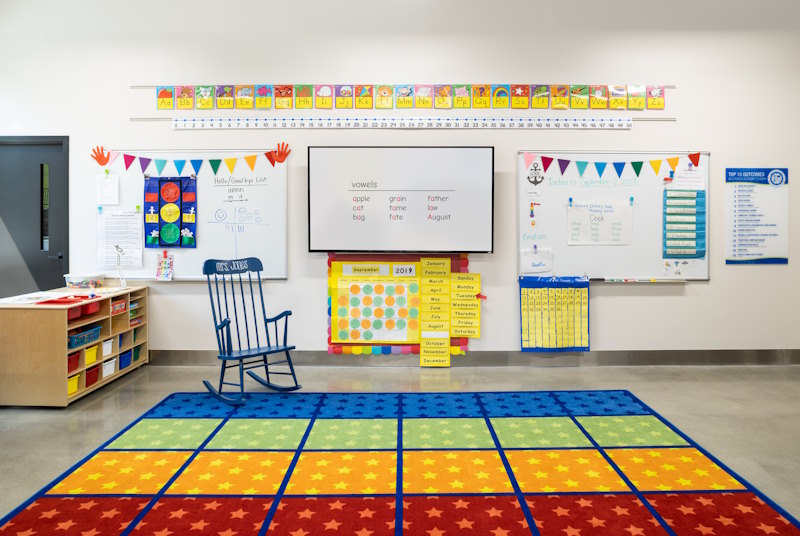
We expect each teacher to manage his or her classroom. Believing in the mission of the school and the merits of the curriculum, teachers are intentional about putting course material in front of students and redirecting distracted behavior when necessary. A classroom with unmistakable, consistently enforced boundaries frees students to learn and achieve their full potential as readers, writers, speakers, and thinkers. In our elementary schools, our reliance on Direct Instruction ensures that every minute is accounted for. Class time is fast-paced and efficient, lessons are clear and precise, and outcomes are anticipated and celebrated. While students transition to the Classical approach in junior high and high school, teachers still provide structure and maintain order in lessons, workshops, and seminars.
If we expect teachers to manage discipline themselves, what is the role of administration in classroom management and discipline?
Our administrators are available to escalate consequences and work with teachers and families to discern whether our school is ultimately the right fit for repeat offenders of our protocols. The presence of our administration in the hallways and classrooms makes them more aware of patterns in disruptive behavior. We have high standards at Thales Academy, but they are reasonable and attainable. We believe young people—with as much dignity and desire to make good decisions as adults—can strive for academic and moral excellence.
How does practical and meaningful instruction aid classroom management?
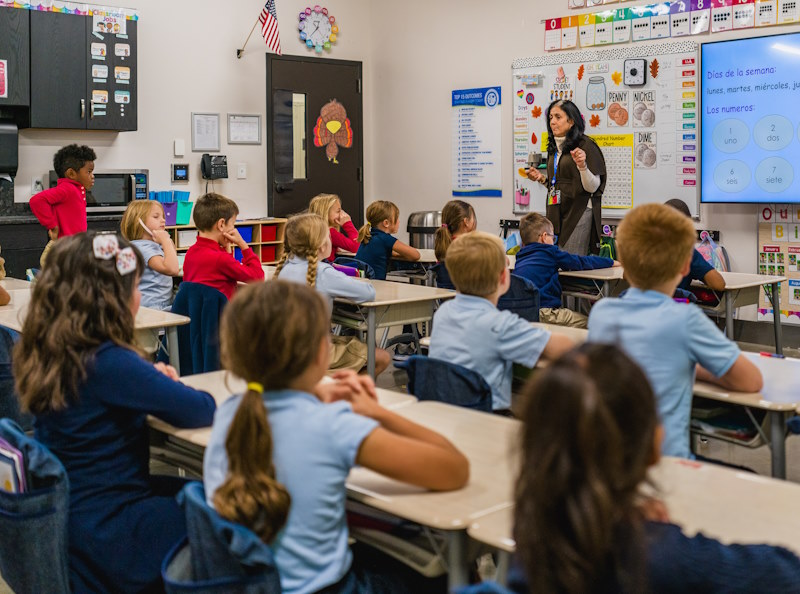
A teacher who merely lectures and/or is inconsistent or illogical with consequences often permits—or invites—unruliness. A teacher who instructs practically and meaningfully and follows through with appropriate consequences to promote learning and good culture breeds respect. Students have a healthy fear of disappointing the teacher who realistically encourages healthy habits, and this naturally creates a more engaged and thriving classroom.
How does Thales Academy handle repeat behavioral offenders?
As educators, we believe we have an important obligation to our families, which is to make the occasional decision to ask students to move on if their behavior continues to show a lack of regard for our protocols. While teachers are empowered to manage discipline, administrators are asked to keep an eye on how much energy their faculty spend redirecting and/or supporting students who are not contributing to our community of learners. In the case of repeat violations of our protocols and failure to meet our standards, the result may be the termination of a student's enrollment at Thales Academy.
What role does our broader school community have in supporting student success?
It is truly only within a community that students can be emboldened by their education both in knowledge and character to become productive, virtuous citizens. Students are best served when administrators, teachers, parents—and they as students—work together to make our school the best possible place to learn.
Academic Focus
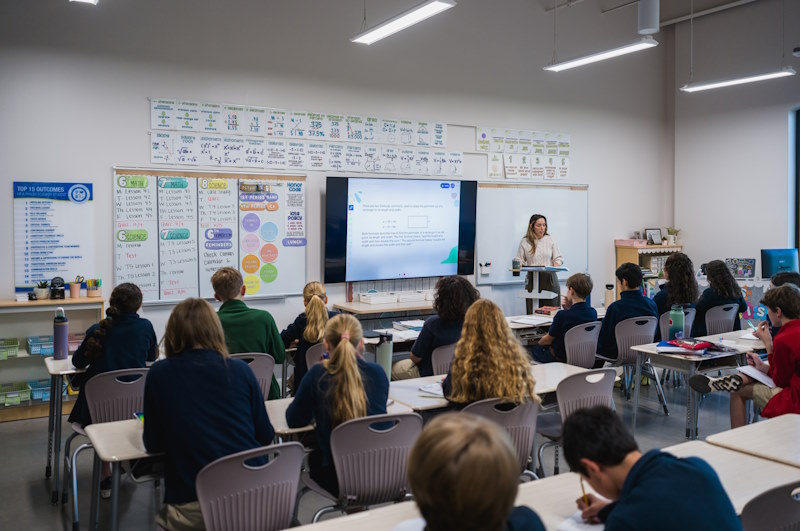
The main thing is to keep the
main thing the main thing.
— Stephen Covey
To maintain the highest educational standards for our students, academics are a top priority at Thales Academy. Our policies aim to minimize non-academic distractions to set our students up for academic success.
No Fundraising Policy
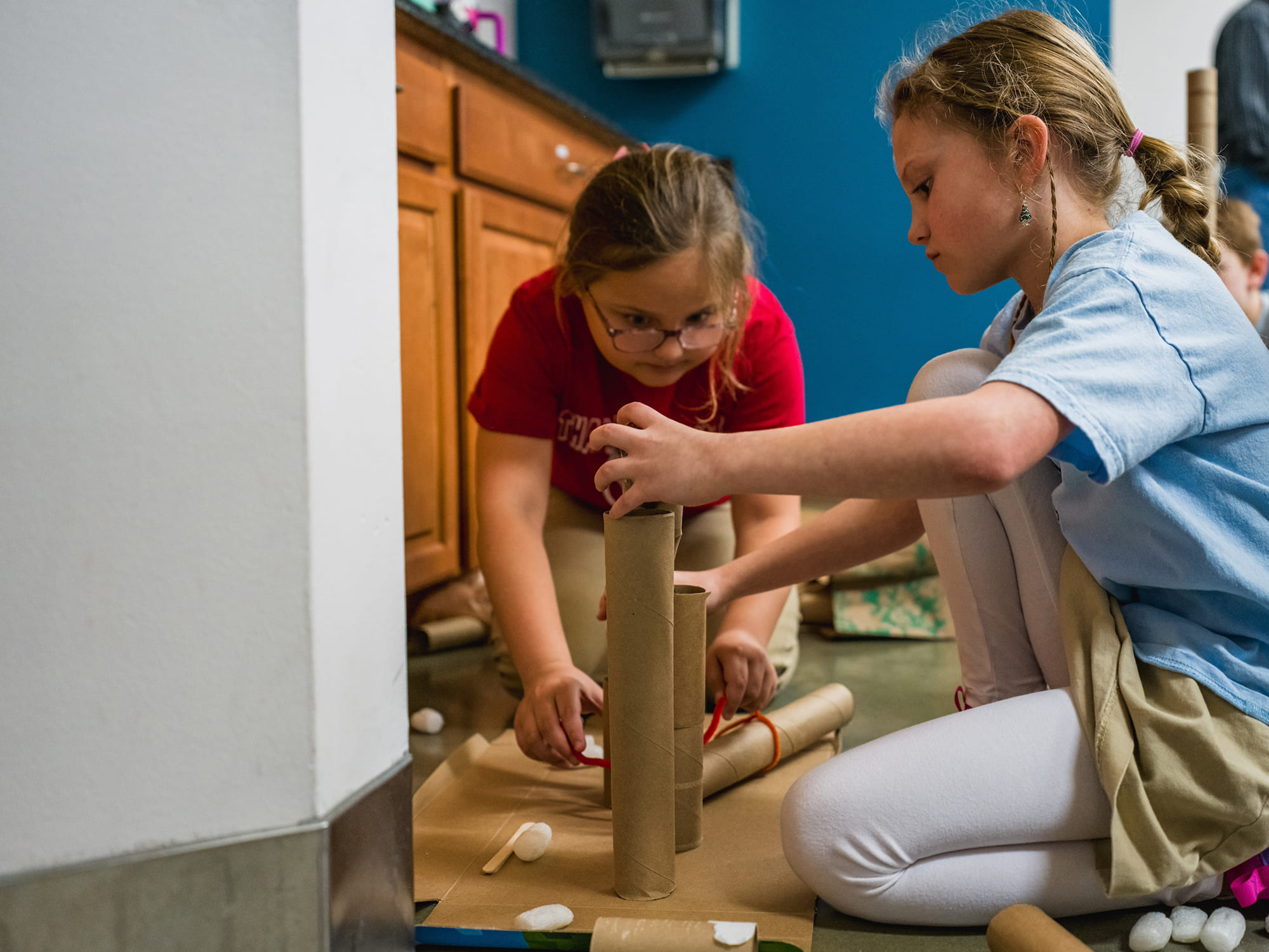
Thales Academy does not allow or accept donations or fundraising of any kind, for any reason. This policy allows educators to focus on achieving the best possible outcomes while continually reinforcing Thales Academy’s educational principles of self-reliance and creativity.
An exception to this policy is the acceptance of donations of castoff household items and consumables such as empty paper towel rolls, empty 2-liter bottles, used books and toys, etc. needed by educators for classroom and school pedagogy.
Celebrations & Gifts Guidelines
Celebrations of special days like birthdays and holidays as well as gestures of gratitude and celebrations of teachers are intentionally simple at Thales Academy to maintain our academic focus, our no fundraising policy, and emphasis on virtue.

- Food should never be sent in for celebrations or teacher/staff gifts.
- A birthday song or a seasonal craft are some examples of ways we will honor special days.
- Gifts for students should not be brought to or exchanged at school.
- Gifts for teachers/staff are permitted with the following guidelines:
- Thales Academy does not allow or accept donations of any kind, for any reason, so any monetary or purchased item collection for a group gift is not allowed.
- Individuals, however, may choose to give in modest ways—handwritten cards, nominal gift cards ($25 limit), and other no- or low-cost, meaningful expressions of gratitude to teachers/staff are permitted.
- We would like to remind families, however, that the best gift to a teacher/staff member is students who arrive at school on time, well-rested, dressed nicely, with a good attitude, with good behavior, and ready to learn. Families can nurture this gift through encouraging excellence in study habits, time management, and reasonable bedtimes for their students.
Extracurriculars
Extracurricular activities can serve a wonderful supplementary role by encouraging joy and stress relief as well as nurturing many meaningful life and career skills and encouraging students to explore and expand their talents beyond the classroom. Many of our students are also avid athletes, dedicated club leaders, regular community volunteers, active artists, and more. However, we ask our families to remember that these are indeed "extra" activities, and academics must come first when school is in session.
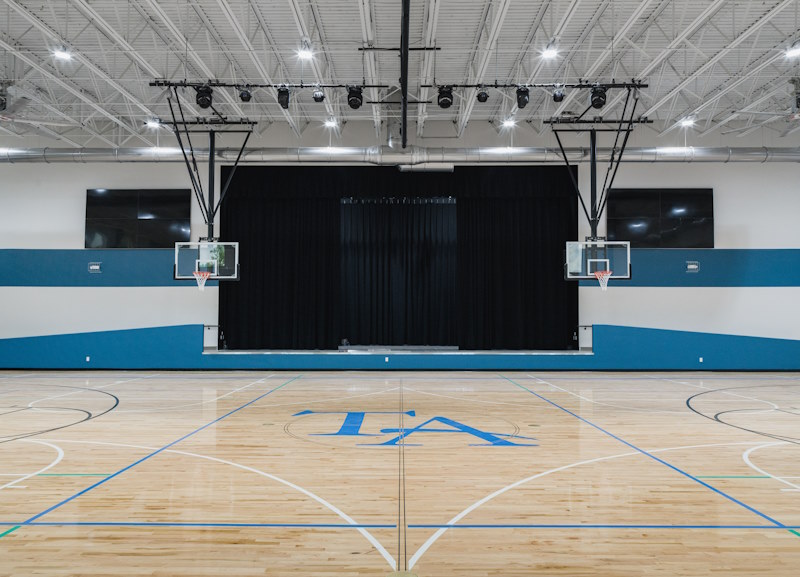
Sports are a particularly difficult extracurricular arena for children, adolescents, and young adults to balance, particularly with the media showcasing the lavish lifestyles of professional athletes and various youth sports organizations promising that possibility for those most willing to deeply invest time, money, sweat, and increasingly, travel.
It is very easy for students' academics to suffer when sports become the focus.
Athletics should complement academics, rather than overshadow them, and many of our families appreciate that our students have the opportunity to explore new challenges and develop skills in a sports environment that demands character before competition. Thus, we have developed the following policy to help our students stay focused on academics alongside their athletic pursuits. Some of our best students are star athletes, so it can be done, and we appreciate the help from home to teach students to succeed in achieving this balance by encouraging positive habits in time management, self-discipline, studying, and more.
Student Athlete Policy
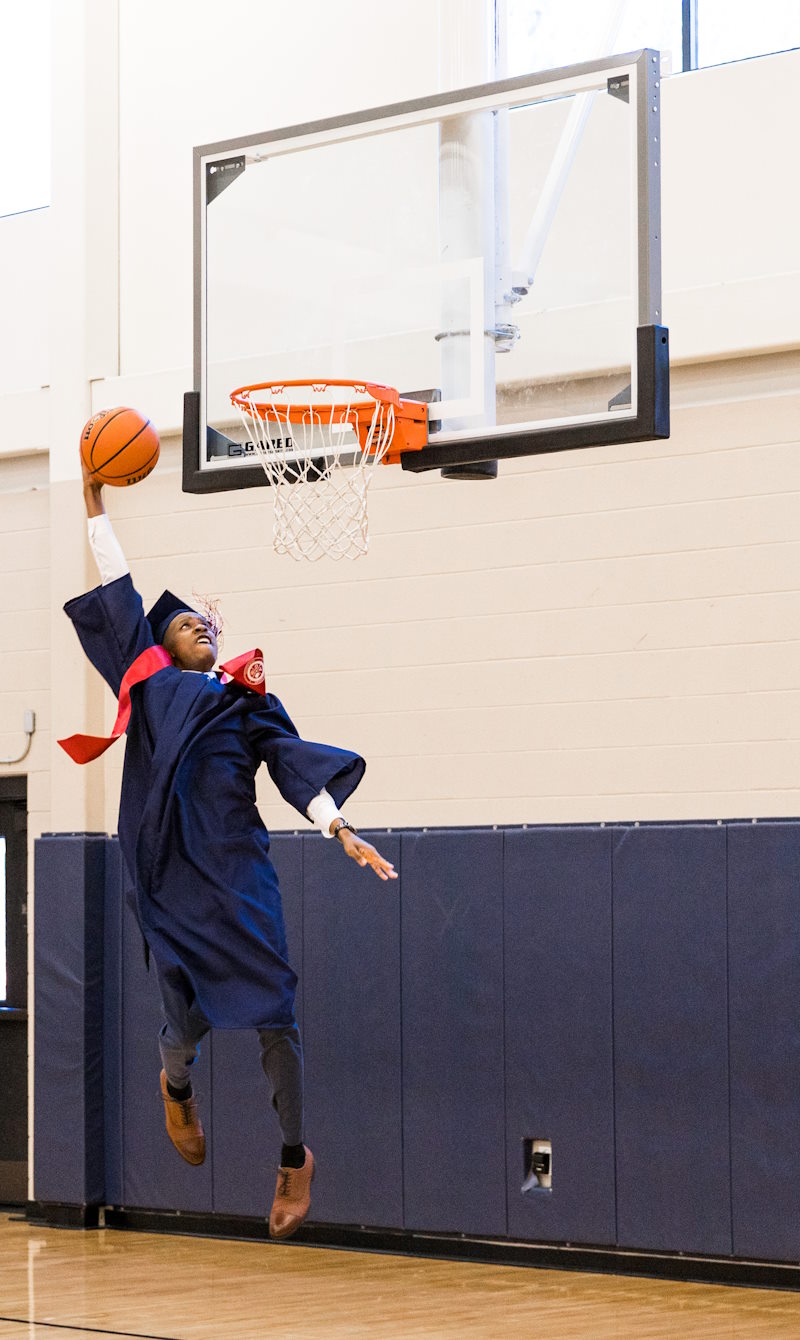
Student Athlete School-Sponsored Athletics Participation Policy
Weekly Grade Checks: Student athletes' academic eligibility for school-sponsored athletics participation will be determined by regular weekly grade checks performed by the campus Athletic Director, starting in Week 2 of each academic quarter:
- Course grades are updated weekly by staff every Monday by 4:00pm.
- Between Monday at 4:00pm and noon on Tuesday each week, the campus Athletic Director is responsible for checking Canvas grades for all athletes, ensuring they meet the standards listed below. (Parents/students have access to Canvas to check/monitor their grades at any time as well.)
Eligibility Definition: Students will be deemed academically ineligible for school-sponsored athletics participation for the week if they have two course grades below a 70% OR one course grade below a 60% at that week's grade check.
Notifications: For students deemed academically ineligible for school-sponsored athletics participation that week:
- A letter will be emailed to the parents/guardians, with Head Coaches copied, by 3:00pm on Tuesday
School-Sponsored Athletics Academic Probation Notice template - The student will be notified in person by the Athletic Director prior to the end of the school day on Tuesday.
Consequences:
- Any student deemed ineligible for athletic participation during the weekly grade check will be ineligible through Monday of the following week, when the Athletic Director completes the next grade check.
- Students must be academically eligible on the first day of tryouts to try out for any sport.
- Once on a team, students who are ineligible cannot participate in games or practices; however, they are still required to attend to remain an active member of the team.
Re-Eligibility: Students may become re-eligible for games/practices the following Tuesday if they meet the 70% grade standards across all courses in that week's grade check.
- When a sports season overlaps quarters, at the beginning of each quarter, students will be automatically eligible to participate, for example: Student A is a basketball player and is ineligible the last week of Q2. Once the 3rd quarter begins, Student A is now eligible to participate as grades reset each quarter.
Homework

At Thales Academy, homework plays a meaningful role in reinforcing classroom instruction, fostering strong study habits, and cultivating responsibility and independence in our students. That said, research increasingly points to the importance of free time and family time to child development.* Thus, we consistently are endeavoring to improve our academic day to reduce the amount of homework time required at home so that our students can enjoy time every day after school to be with their families, improve family bonds, enjoy free play, and take reasonable risks on their own.
The benefits of homework are best achieved when families and teachers work together to maximize learning from and reduce stress related to homework.To this end, we have developed a summary of our homework standards and protocols designed to promote consistency, support learning at home, and uphold our commitment to academic excellence. Thank you for helping support your student with a positive homework experience.
K–5
Assignments & Schedule
Homework:
- Homework is drawn directly from curriculum-provided materials and is fully aligned with the instructional objectives of each lesson.
- Homework is assigned Monday through Thursday for Reading Mastery and Saxon Math.
- Homework is not assigned over weekends, holidays, or track outs.
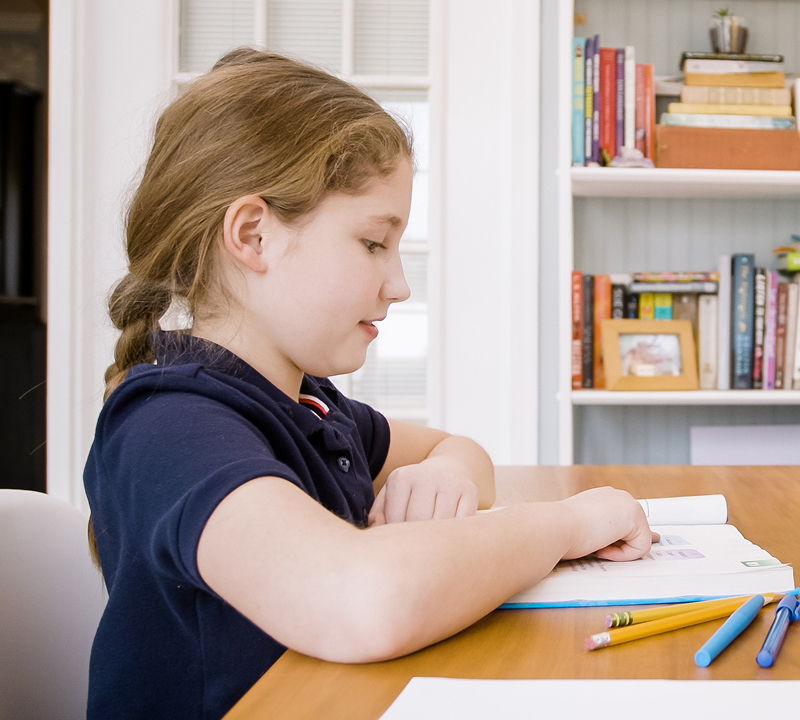
Assessments:
- Assessments are not administered on Mondays.
- Assessments are administered according to the pacing guidelines of the curriculum.
Homework Grading and Review
- Homework is reviewed daily in class using structured Direct Instruction procedures to reinforce learning and promote accountability.
- Grading aligns with K–5 policies and curriculum-based rubrics.
Daily Time Expectations
- Students may begin homework during the independent work portion of each lesson and finish it at home, if needed.
- Efficient students should find minimal homework time is needed at home.
- Average Daily Time Expectations for Homework Completion by Grade Level (this total includes some independent work time students will be given to complete their homework in school):
- K–1: 5 minutes
- 2–3: 15 minutes
- 4–5: 20 minutes
JH/HS
Assignments & Schedule
Homework:
- Homework is designed to be purposeful and meaningful practice of a skill or preparation for a discussion.
- Literature reading and Math problems may be assigned daily Monday through Thursday. Only reading may be assigned over the weekend.
- Literature Reading Homework Expectation: 1 page per night per grade level (e.g., 6 pages for 6th grade)
- Math Problems Homework Expectation: 10-15 problems, depending on a lesson’s complexity or grade level
- Written homework assignments in core subjects are limited to provide a balanced workload.
- Homework is not assigned overnight in electives. Students may choose to work on long-term projects or prepare for a performance.
- Students enrolled in Honors or Advanced Placement (AP) courses may have additional or extended assignments that occasionally fall outside the designated schedule.
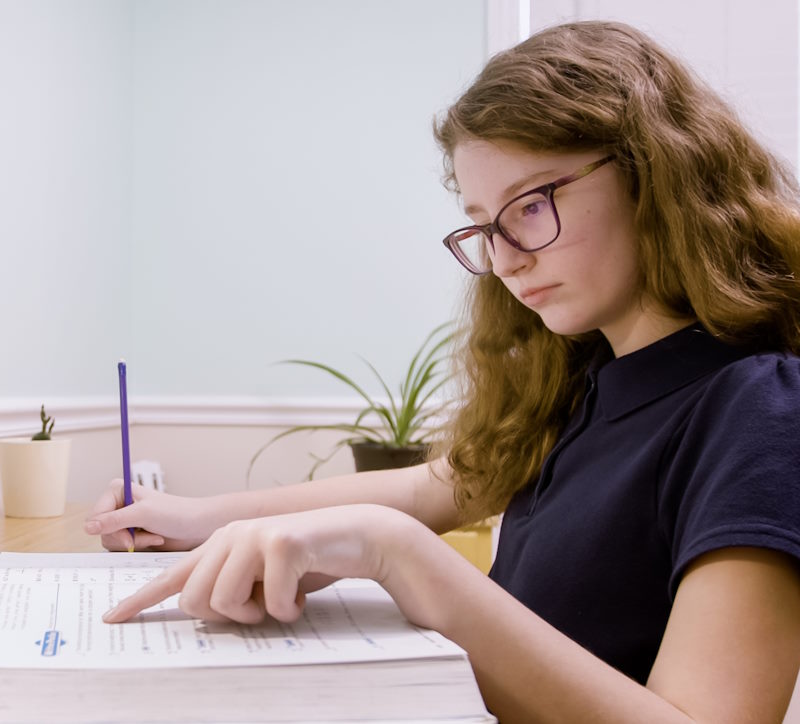
Assessments & Review:
- Teachers of core subjects in each grade will coordinate with each other when scheduling assessments. Assessments are not given on Mondays.
- Students can expect a minimum of 2 quizzes and 2 tests throughout each quarter. Teachers announce tests and provide study guides at least 72 hours before.
Assignment Grading
- All classwork and homework are graded in consideration of the following:
- Quality of writing and depth of thought
- Accuracy of responses and demonstration of student comprehension
Daily Time Expectations
- While in-class and at-home work habits will affect homework completion, homework is not designed to exceed the following time limits:
- Junior High: 1 hour
- High School: 1.5 hours
- Students returning from absences may need to use weekends for makeup work.
Support from Home
- Students who struggle to finish classwork or homework assignments within a reasonable time should communicate this with their teachers and parents.
- Parents are encouraged to address discrepancies with what is assigned and our specified guidelines. We ask that such communication be professional, respectful, and focussed on solutions aligned with our shared goals for student successes.
Stewardship

We make a living by what we get,
but we make a life by what we give.
— Winston Churchill
At Thales Academy, as we seek to nurture virtuous leaders prepared for a life well-lived, we continue to find ways to elevate stewardship in our student experience across all ages. Contributing to the overall well-being of our school community is a natural place for students to learn good stewardship.
- Promoting Beauty and Order: Students assist in keeping our school environment clean and organized, reinforcing a sense of pride and respect amongst them. This includes participating in meaningful cleaning activities designed to build not just cleaner spaces, but stronger character. By contributing to the care of their environment, students learn responsibility, teamwork, and the value of hard work. These small actions help shape thoughtful, respectful individuals who take pride in their surroundings and themselves.
- Ensuring a Safe Environment: Students monitor hallways, walkways, and entrances/exits to ensure fellow students behave appropriately and adhere to safety protocols.
- Assisting with Dismissal: Students help fellow students prepare for dismissal at the end of the day, ensuring a smooth and safe transition.
- Peer-to-Peer Education: Students serve as positive role models and leaders, teaching other students about school safety and appropriate behavior and helping with studies and homework.
Participating in such ways in our school community reinforces many of our Top 15 Outcomes of a Thales Academy Student beyond virtuous leadership, such as being a cooperative and contributive team member, possessing a strong work ethic, and having a spirit of gratitude. We appreciate additional support from home in encouraging students to be a good steward at school, at home, and in other places as it is true that "tall oaks from little acorns grow."
Locker Guidelines (Grades 3–12)
At Thales Academy, our lockers are an extension of our personal dignity and a reflection of our shared ethos of discipline, respect, and care for our surroundings. As students of classical virtue, we strive to maintain beauty and order not only in our thoughts and words, but in the spaces entrusted to us.
A Place for Everything and Everything in Its Place
All books and binders shall be placed on the bottom half of the locker, ideally arranged in the order of class use from left to right. This ensures a smooth and efficient transition between subjects and cultivates the habit of attentiveness.
Backpacks and Lunch Boxes
A student's backpack should be zipped and hung neatly on the top hook within his or her locker (or carried with him or her in an orderly manner and stored neatly where directed if permitted inside the classroom). If a student brings a lunch box, it is to be stored where directed by his or her campus and taken home and cleaned out at the end of each day. This practice upholds the virtue of tidiness and prevents clutter or odors.
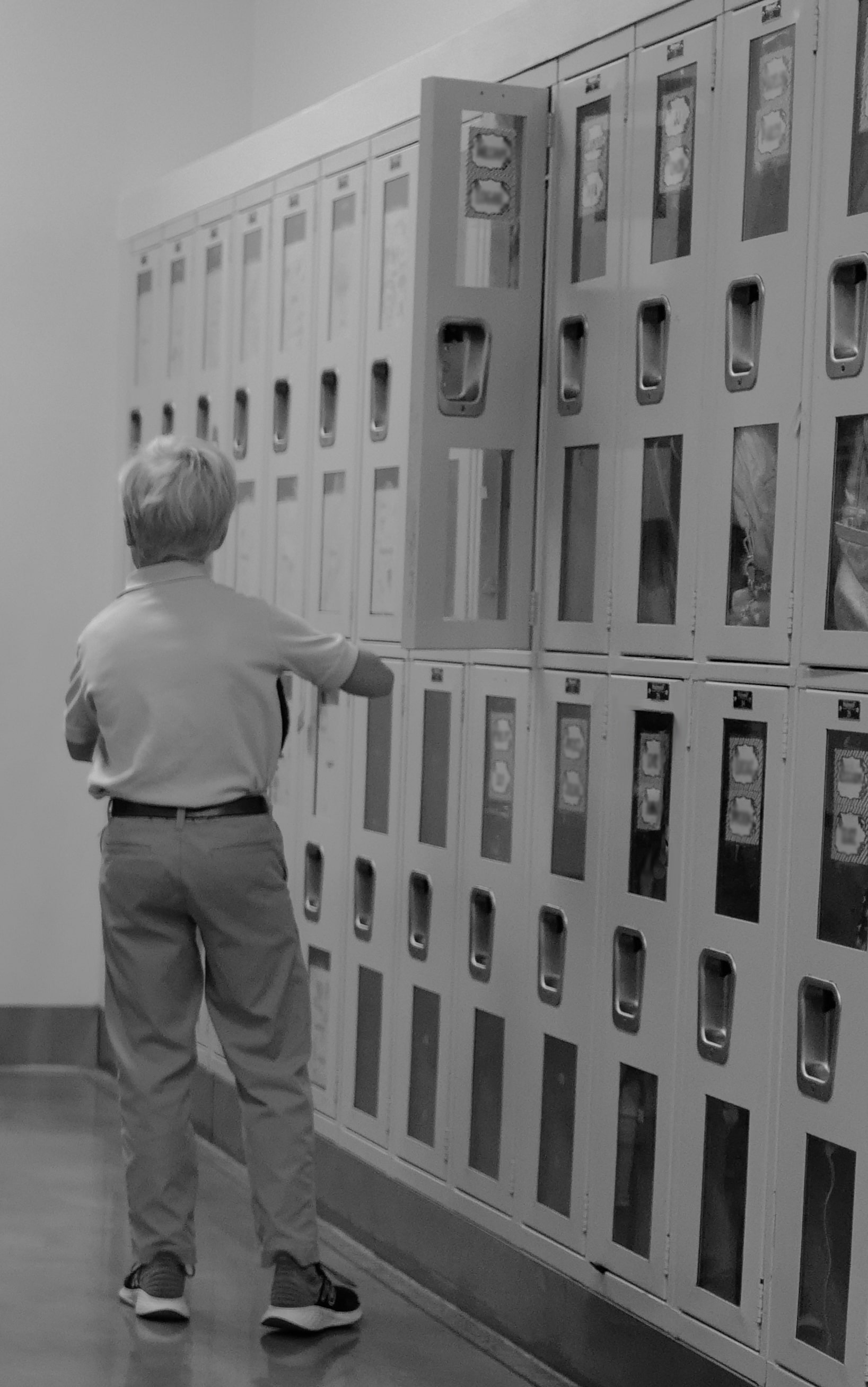
Cleanliness is Courtesy
Lockers must remain free of:- Loose papers
- Unopened or opened food
- Food wrappers, crumbs, or debris
- Other unnecessary clutter
- Decorative items must be limited to inside the locker and be minimal and tidy in appearance.
- The plexiglass area of the locker must remain free of obstruction.
- Locks are not permitted.
Cultivating Habits of Excellence
At the end of each day, students should take a moment to:
- Align books.
- Zip backpacks.
- Remove unnecessary papers or items.
In doing so, students will develop the lifelong habits of discipline and stewardship.
Moving Between Classes
Students will go to their lockers quickly and quietly between classes. Time between subjects is not for socializing or lingering. We move with purpose and respect for others, keeping voices low and actions swift. This honors both the flow of the school day and the dignity of our shared learning environment.
Last Visit
Last visit of the day to lockers must be between 6th and 7th period, so students can depart directly from class to carpool after the 7th period.
Students should treat their lockers as a small sanctuary of peace and purpose—where thoughtfulness resides and chaos is not welcome—and keep in mind in all areas that "good order is the foundation of all things" (Edmund Burke).
Classroom Cleaning
At Thales Academy, cleaning the classroom is an important way to help each other and contribute to our school community. Keeping our building clean is a shared responsibility.
A Quick Guide to Cleaning Your Classroom
- Begin by pushing the desks into a neat row.
- Place one chair on top of each desk.
- Pick up any trash from the floor.
- Wipe up any small spills, food, or sticky spots with a damp paper towel.
- After each damp paper towel wipe, use a dry paper towel to dry the damp spot.
- Throw the used paper towels away in the trash can when you are finished.
- Once the floor is clear, get out the broom and begin sweeping around the four sides of the room.
- Then, move across the middle of the room in a line as you sweep, moving back and forth so no areas are missed. (Be careful not to knock the chairs as you work!).
- Use the dustpan to collect the dirt and trash you sweep up.
- Empty the dustpan into the trash can slowly to avoid creating dust.
- Carefully remove the full bag of trash from the trash can without tearing the bag and tie it closed. This prevents unexpected spills.
- Get a clean trash bag from the bottom of the trash can and open it and line the trash can with it. Then, put the top back on the trash can.
- When taking the bags outside—one student should hold the door open for the other to pass through to make sure no one is locked out.
- Place the tied trash bags on the sidewalk outside of the door nearest to the dumpster, off to the side and not in the path so no one trips over them.
- Leave the bags off to the side, and Thales Academy adult team members will move the bags to the dumpster later.
- Ensure any leaks from the trash bag left on the floor are cleaned with a damp paper towel, followed by a dry paper towel to dry up any damp spots. Throw away the used paper towels in the trash can.
- Wipe the dustpan with a damp paper towel and clean any dust off the bottom of the broom bristles. Throw away any removed dust and the used paper towel in the trash can.
- Return the broom and dustpan to the closet and admire how much better the room will feel to anyone who enters thanks to your cleaning efforts!
Working together to help clean makes
a healthy learning environment for everyone.
Pre-K–5 Dress Code
School uniforms are required for all students attending Thales Academy. Uniforms are to be worn at all times. All uniforms are to be neat, clean, and in good condition. Clothing must meet the following criteria or students will be required to contact their parents/guardians for a change of clothing.
Bottoms

Boys and Girls
Pants, Shorts, Skirts, & Skorts
Color: Khaki or Navy Blue
Style & Length: Shorts & skirts/skorts: Dress-style, knee-length (at the knee); Pants: Dress-style, full-length, straight-leg
No cargo-style, capri-style, knit, stretch, denim, or corduroy material allowed. Pants must be straight-leg style only—No wide leg, skinny, boot cut, flare, etc.
Skirts must be worn with bike or knit shorts, leggings, or tights (white, navy, light blue, or red only) underneath.
All garments must be free of holes, rips, and/or tears.
Jumpers and Polo-Style Dresses

Girls
Jumpers
Color: Khaki or Navy Blue
Length: Knee-length (at the knee)
Style: Jumpers should be professional and appropriately fitting.
Jumpers must be worn with a short- or long-sleeve polo-style, collared shirt underneath.
Jumpers must be worn with bike or knit shorts, leggings, or tights (white, navy, light blue, or red only) underneath.
No corduroy or knit material.
Polo Style Dresses
Color: Navy Blue, Light Blue, or Red
Length: Knee-length (at the knee)
Style: Polo-style dresses should have a collar and be professional and appropriately fitting.
Polo-style dresses must be worn with bike or knit shorts, leggings, or tights (white, navy, light blue, or red only) underneath.
Tops
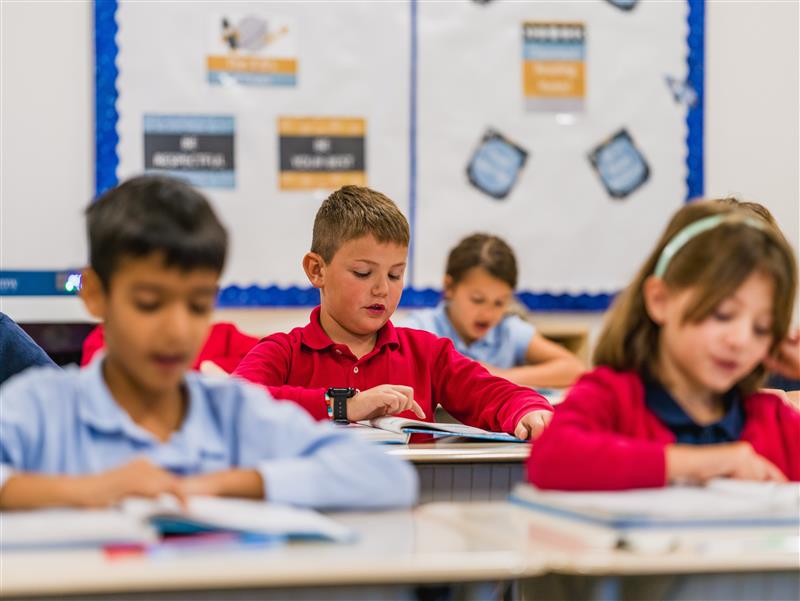
Boys and Girls
Shirts
Color: Solid Red, Navy, Light Blue only
Style: Polo-style cotton or dri-fit collared shirts, long sleeve or short sleeve
No button down blouses.
Turtlenecks in colors red, light blue, and navy are acceptable if they are worn under school appropriate sweaters or sweater vests. Turtlenecks may not be worn alone. Polos should be free of graphics, emblems, or designs such as Polo, Under Armour.
Sweaters

Color: Solid Red, Navy, Light Blue only
Style: Woven, knit pullover sweater, sweater vest or cardigan. Crewneck or V-neck are allowed. A polo style, collared shirt must be worn under all sweaters, vests or cardigans.
Inside: Sweaters with hoods are not allowed.
Fleece
Color: Solid Red, Navy, Light Blue only
Style: Fleece pullovers, fleece vests, or fleece jackets are acceptable and can be worn in class. A polo style, collared shirt must be worn under all Fleece pullovers, fleece vests, or fleece jackets.
Sweatshirt fabric not allowed.
Footwear
Boys and Girls
Allowed: Low-top tennis shoes (no bright neon-colors; no character-themed)
Close-toed, solid brown, black, or navy dress flats/shoes
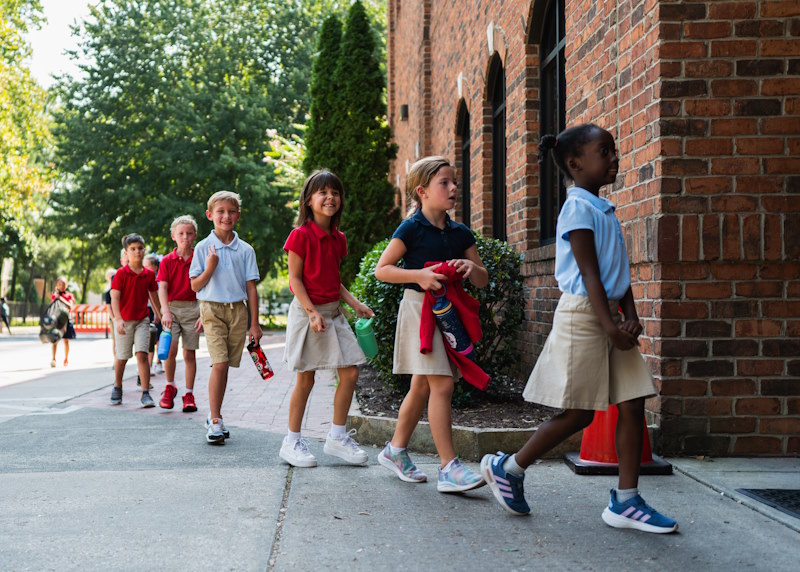
Prohibited:
- High top sneakers
- Heels
- Boots
- Ugg-style shoes
- Sandals
- Clogs
- Flip-flops
- Sport Slides
- Crocs
- Mules
- Heelys or other wheeled shoes
- Blinking, light-up, or noise-making shoes
- Shoe charms
- Shoe sequins/gems
- Socks above ankle-length
- Leg warmers
Socks: Socks must be solid color of white, black, gray, or navy blue only and be ankle-length.
Leggings and tights: Leggings and tights must be solid color of white, navy, light blue, or red and are only allowed to be worn under skirts, jumpers, and polo-style dresses.
School Gym Uniforms and PE Classes
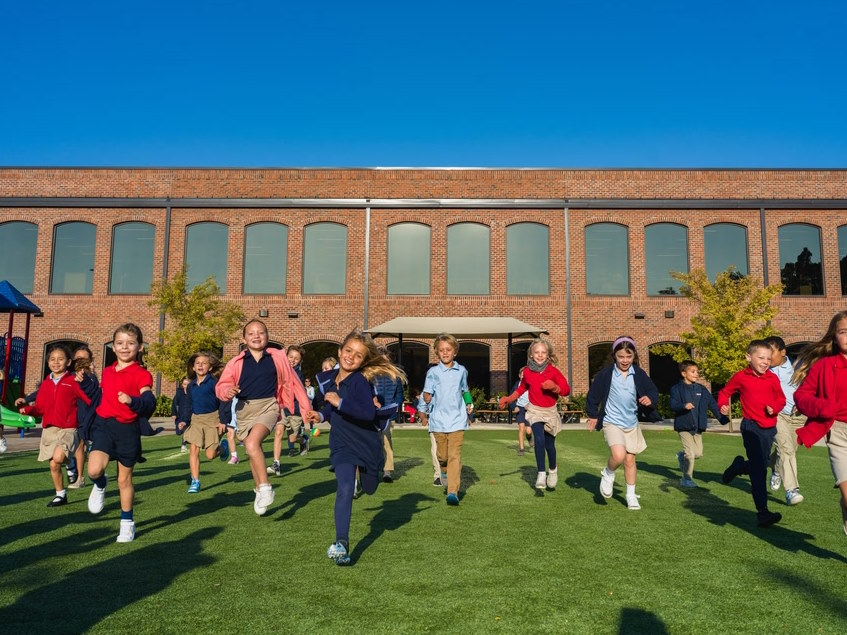
Pre-K–5 students do not dress-out for PE.
Accessories

Piercings/Jewelry: Girls may wear small earrings only; earrings should not contain inappropriate text or symbols.
Boys may not wear earrings.
No facial piercings
No smart watches, Fitbits, or other watch-style smart devices.
All jewelry/watches/belt buckles should not be excessively large or gaudy and should not contain inappropriate text or symbols.
Makeup: Makeup should not be heavy. Temporary and/or permanent tattoos, and face/body glitter are not allowed. Nail polish, if worn, should be in natural colors only.
Hair: Student hair should not be colored, highlighted, tinted and/or dyed hair in unnatural colors or have faux hawks. Boys’ hair length should be clean cut and above the collar. Boys are required to be clean shaven. No Fairy Hair.
Hair Accessories: Headbands, hair bows, and other hair accessories should be solid in color and not include any glitter, sparkles, gems, charms, or character-themes; no neon- or metallic-colored hair accessories. All hair accessories should not be excessively large or gaudy and should not contain inappropriate text or symbols.
Hats and Head Gear: Hats, bandanas, or other head coverings are not allowed to be worn inside of the buildings.
Other Notes Regarding Dress Code

- Shirts are to be tucked in at all times.
- Bike or knit shorts are to be worn under skirts.
- No coats, hoodies, jackets, sweatshirts, or non-uniform sweaters/fleeces may be worn in the classroom.
- Undergarments must not be visible when students are in uniform.
- Shirts must be properly buttoned and must be tucked.
- No deep V-necks or plunging necklines may be worn.
- Undershirts, camisoles included, should be white and/or match school colors and should be tucked in appropriately. Boys' undershirts should be t-shirt style only.
- Outside: Other outerwear may be worn outside of the school building only but may not not contain inappropriate text or symbols.
- Backpacks: Wheeled backpacks are prohibited.
- Articles of clothing or accessories not detailed or listed in this section will be considered not in compliance with the dress code.
- School administration makes the final decision on the acceptability of items in reference to dress code. All decisions are final and are not subject to appeal.
Dress-Down Policy

Student Spirit Day Dress Code Policy
Thales Academy holds special “spirit days” where students and teachers may wear attire outside of the normal dress code. On spirit days, students may wear a spirit t-shirt with uniform bottoms. These days are announced in advance and typically fall on the last Friday of each month/quarter and field trips. Campus administrators will notify students about specific days. The spirit shirts must be Thales approved spirit wear from our campus store or an approved club t-shirt. No hoodies are allowed on spirit days. Shirts must be tucked in at all times. As a campus we will host one spirit week each year for homecoming. All Thales Academy students’ attire every day should reflect that you are a representative of Thales Academy.
Dress Code Violations & Enforcement
Dress Code Enforcement Policy

- All Thales Academy team members have been assigned the responsibility to uphold the dress code.
- Articles of clothing or accessories not detailed or listed in this section will be considered not in compliance with the dress code.
- Students may be reported and sent to the front office for dress code violations by any Thales Academy team member, even if it is not his or her student, and for any dress code violation, including untucked shirts and rolled-up shorts/skirts/skorts.
- The Office Manager will confirm details with the reporting Thales Academy team member and issue consequences (see below for list of consequences). (Students may be required to wait in the instance of a busy front office.)
- All Thales Academy team members are trained to show prudent judgment that upholds our school's official policies and values, and their decisions to report any students for violations will be final and not subject to appeal without requiring any additional review from Heads of Schools or Leadership.
- School administration makes the final decision on the acceptability of items in reference to dress code. All decisions are final and are not subject to appeal.
Pre-K–5 Dress Code Violation Consequences
First Offense: An official written warning will be recorded and shared.
Second Offense: An official written warning will be recorded and shared, and a call will be made to the parent/guardian.
Third Offense: An official written warning will be recorded and shared, and a call will be made to the parent/guardian. If the dress code violation requires a change of clothes to comply, a parent/guardian will be contacted to bring an appropriate change of clothing for the student before the student may return to class and/or to pick up any prohibited items if necessary.
Fourth Offense: 1 day suspension
Fifth Offense: 3 day suspension and student's enrollment put under review
Uniform Retailer Guidelines
Families are welcome to purchase students' daily uniforms at any retailer they choose, as long as uniforms are in compliance with our dress code policies. (We have also arranged uniform stores with Lands' End, if preferred.) Please note that all students must purchase PE uniforms and spirit wear directly from their campus online stores; more information will be provided by your campus.
JH/HS Dress Code
School uniforms are required for all students attending Thales Academy. Uniforms are to be worn at all times. All uniforms are to be neat, clean, and in good condition. Clothing must meet the following criteria or students will be required to contact their parents/guardians for a change of clothing.
Bottoms

Pants, Shorts, Skirts, & Skorts
Color: Khaki or navy blue
Style & Length: Shorts & skirts/skorts: Dress-style, knee-length (at the knee); Pants: Dress-style, full-length, straight-leg
No cargo-style, capri-style, knit, stretch, denim, or corduroy material allowed. Pants must be straight-leg style only—No wide leg, skinny, boot cut, flare, etc.
Skirts must be worn with bike or knit shorts or tights (white or navy only) underneath; no leggings.
All garments must be free of holes, rips, and/or tears.
Belts must be worn with pants, shorts, skirts, or skorts if they have belt loops. Belts must be brown or black in color, and cannot be embellished with decorations.
Tops
Shirts, Sweaters, Fleece

Inside: Jackets and sweatshirts with hoods and crewneck sweatshirts are not compliant with the dress code. No hoods are allowed in the building. The following items are acceptable in the building:
- Collared shirts: Long sleeve or short sleeve. Polo style. Colors are solid navy blue, red, light blue, hunter green, or maize yellow. High school students may also wear white.
Oxford shirts are allowed to be worn for high school students. - Pullover sweater, sweater vest, or cardigan: Crewneck or v-neck in solid navy blue, red, light blue, hunter green, or maize yellow. High School students may also wear white.
- Fleece pullovers, fleece vests, or fleece jackets are acceptable in solid navy blue, red, light blue, hunter green, or maize yellow. High School students may also wear white. No graphics or prominent logos permitted.
- A collared uniform shirt must be worn under all sweaters and fleeces.
- Sweatshirt fabric not allowed.
- Undergarments must not be visible when students are in uniform.
- Shirts must be properly buttoned and must be tucked in at all times. If it is not long enough to stay tucked in, it is not an appropriate shirt. No deep v-necks or plunging necklines may be worn. Undershirts and camisoles should match school colors and should be tucked in appropriately.
- Shirts should be free of graphics, emblems, or designs such as Polo, Under Armour.
Students must wear a uniform shirt under all sweaters and fleeces.
Outside: Other outerwear may be worn outside of the school building only but may not not contain inappropriate text or symbols.
Footwear
Tennis Shoes
All shoes must be closed-toed.
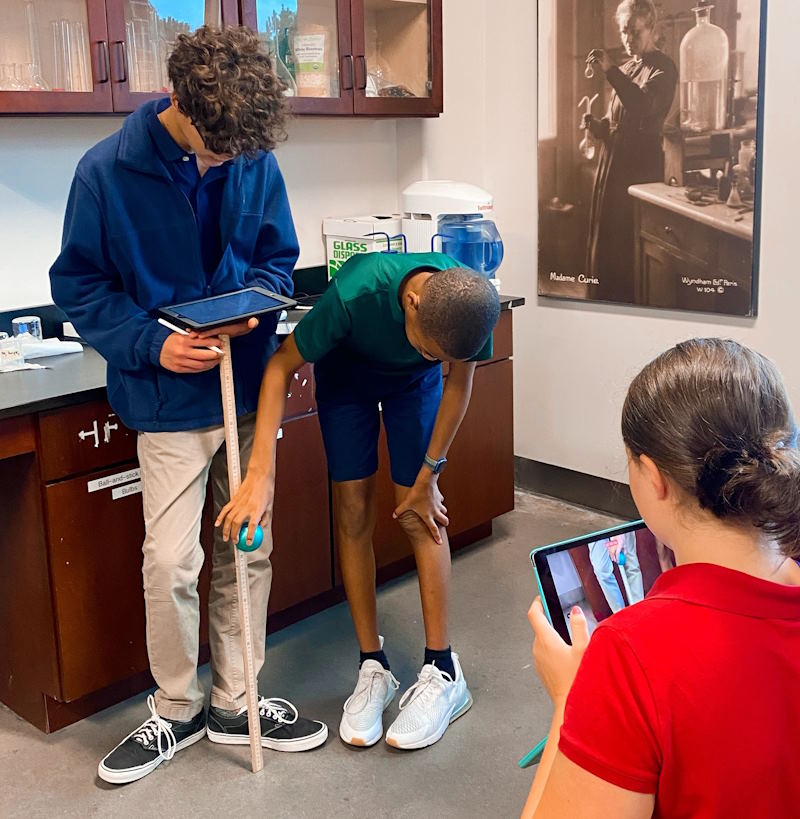
Allowed: Low-top tennis shoes (no high tops; no bright neon-colors; no character-themed)
Close-toed, solid brown, black, or navy dress flats/shoes
Prohibited:
- High top sneakers
- Heels
- Boots
- Ugg-style shoes
- Sandals
- Clogs
- Flip-flops
- Sport Slides
- Crocs
- Mules
- Heelys or other wheeled shoes
- Blinking, light-up, or noise-making shoes
- Shoe charms
- Shoe sequins/gems
- Socks above ankle-length
- Leg warmers
- Leggings
Socks: Socks must be solid color of white, black, gray, or navy blue only and be ankle-length.
Tights: Tights must be solid color of white or navy and are only allowed to be worn under skirts or skorts.
Leggings are not allowed in grades 6–12.
Accessories

Piercings/Jewelry: Girls may wear small earrings only; earrings should not contain inappropriate text or symbols.
Boys may not wear earrings.
No facial piercings
No smart watches, Fitbits, or other watch-style smart devices.
All jewelry/watches/belt buckles should not be excessively large or gaudy and should not contain inappropriate text or symbols.
Makeup: Makeup should not be heavy. Temporary and/or permanent tattoos, and face/body glitter are not allowed. Nail polish, if worn, should be in natural colors only.
Hair: Student hair should not be colored, highlighted, tinted and/or dyed hair in unnatural colors or have faux hawks. Boys’ hair length should be clean cut and above the collar. Boys are required to be clean shaven. No Fairy Hair.
Hair Accessories: Headbands, hair bows, and other hair accessories should be solid in color and not include any glitter, sparkles, gems, charms, or character-themes; no neon- or metallic-colored hair accessories. All hair accessories should not be excessively large or gaudy and should not contain inappropriate text or symbols.

Hats and Head Gear: Hats, bandanas, or other head coverings are not allowed to be worn inside of the buildings.
Belts: Belts may be worn in solid black or brown and are required to be worn with any bottoms that have belt loops. Belt buckles should not be excessively large or gaudy and should not contain inappropriate text or symbols.
Other Notes Regarding Dress Code
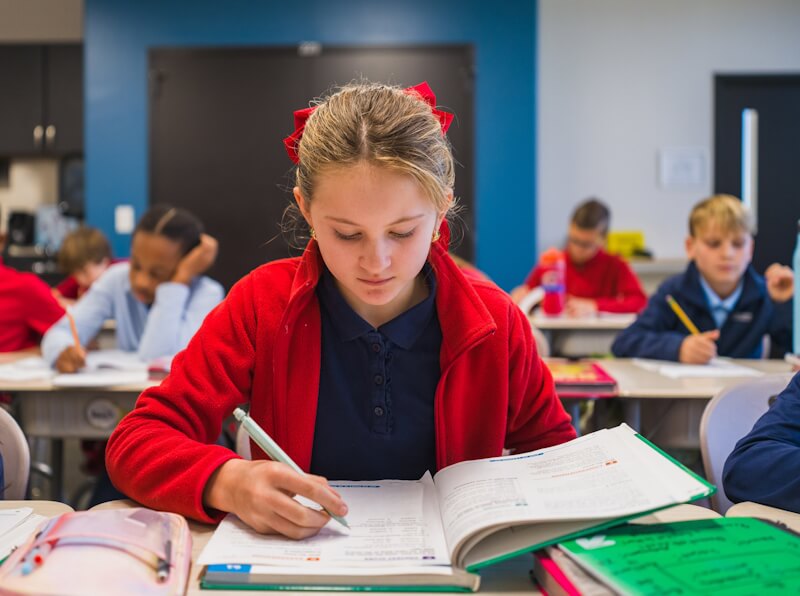
- Shirts are to be tucked in at all times.
- Bike or knit shorts are to be worn under skirts.
- No coats, hoodies, jackets, sweatshirts, or non-uniform sweaters/fleeces may be worn in the classroom.
- Undergarments must not be visible when students are in uniform.
- Shirts must be properly buttoned and must be tucked.
- No deep V-necks or plunging necklines may be worn.
- Undershirts, camisoles included, should be white and/or match school colors and should be tucked in appropriately. Boys' undershirts should be t-shirt style only.
- Outside: Other outerwear may be worn outside of the school building only but may not not contain inappropriate text or symbols.
- Backpacks: Wheeled backpacks are prohibited.
- Articles of clothing or accessories not detailed or listed in this section will be considered not in compliance with the dress code.
- School administration makes the final decision on the acceptability of items in reference to dress code. All decisions are final and are not subject to appeal.
School Gym Uniforms and PE Classes
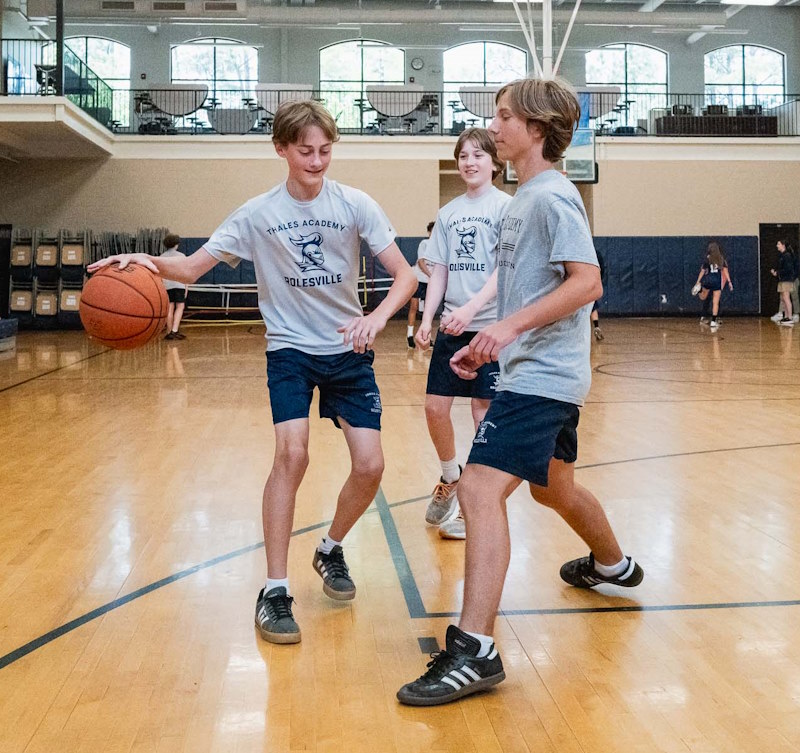
Students at our K–8 campuses wear their school uniforms for PE class. Students at our other campuses must dress out for PE and are required to wear a specific gym uniform consisting of navy shorts and a Thales Academy grey t-shirt (your campus will provide information for ordering your PE uniform if it is required at your campus). All students should have their name written clearly on each article of clothing. It is recommended that this be placed inside the collar of the shirt and on the tag of the shorts.
Sports
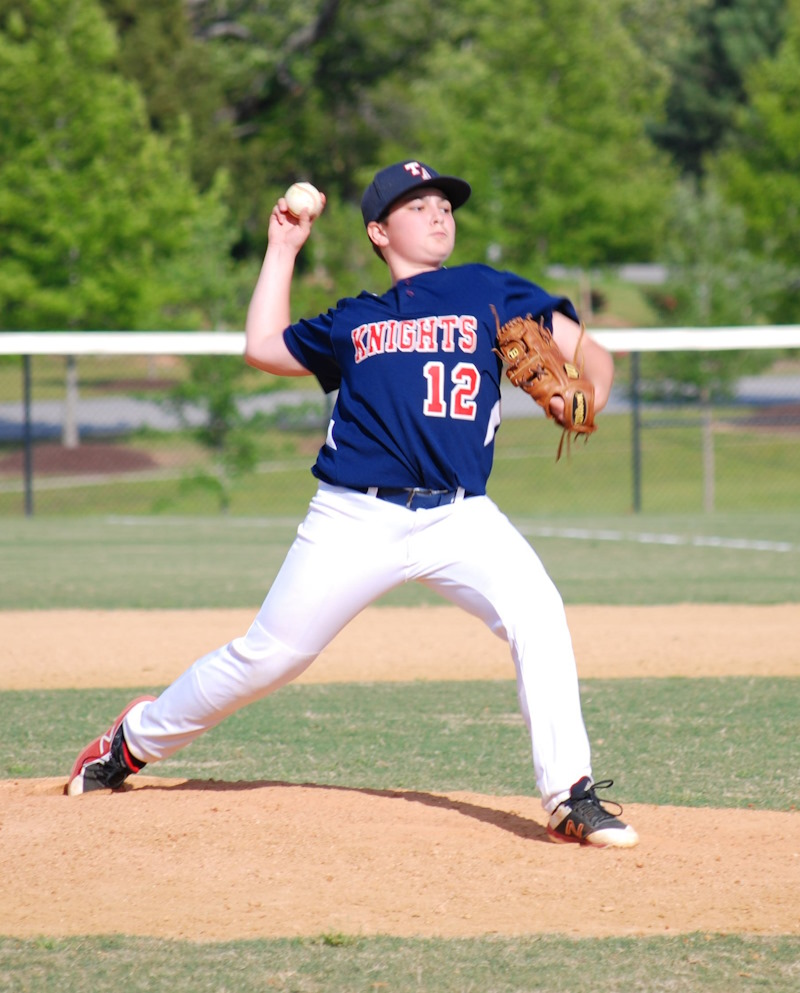
Students participating in school sports will receive instructions for practice and uniform attire guidelines from their coach/athletic director.
Notes will be added below for important universal guidelines.
- Volleyball: Shorts should be 5" inseam in length and solid black or solid navy in color (uniform color directed by campus). Any student whose shorts are not long enough will not be allowed to play.
Dress-Down Policy

Student Spirit Day Dress Code Policy
Thales Academy holds special “spirit days” where students and teachers may wear attire outside of the normal dress code. On spirit days, students may wear a spirit t-shirt with uniform bottoms. These days are announced in advance and typically fall on the last Friday of each month/quarter and field trips. Heads of school will notify students about specific days. The spirit shirts must be Thales approved spirit wear from our campus store or an approved club t-shirt. No hoodies are allowed on spirit days. Shirts must be tucked in at all times. As a campus we will host one spirit week each year for homecoming. All Thales Academy students’ attire every day should reflect that you are a representative of Thales Academy.
Student Athletes: Game day dress requirements will be consistent through all Thales Academy Athletic teams. Students may wear game jerseys and uniform bottoms on home and away game days. Jerseys must be tucked in at all times.
Dress Code Violations & Enforcement
Dress Code Enforcement Policy

- All Thales Academy team members have been assigned the responsibility to uphold the dress code.
- Articles of clothing or accessories not detailed or listed in this section will be considered not in compliance with the dress code.
- Students may be reported and sent to the front office for dress code violations by any Thales Academy team member, even if it is not his or her student, and for any dress code violation, including untucked shirts and rolled-up shorts/skirts/skorts.
- The Office Manager will confirm details with the reporting Thales Academy team member and issue consequences (see below for list of consequences). (Students may be required to wait in the instance of a busy front office.)
- All Thales Academy team members are trained to show prudent judgment that upholds our school's official policies and values, and their decisions to report any students for violations will be final and not subject to appeal without requiring any additional review from Heads of Schools or Leadership.
- School administration makes the final decision on the acceptability of items in reference to dress code. All decisions are final and are not subject to appeal.
JH/HS Dress Code Violation Consequences
First Offense: An official written warning will be recorded and shared. If the dress code violation requires a change of clothes to comply, a parent/guardian will be contacted to bring an appropriate change of clothing for the student before the student may return to class.
Second Offense: 1 day suspension
Third Offense: 3 day suspension and student's enrollment put under review
Uniform Retailer Guidelines
Families are welcome to purchase students' daily uniforms at any retailer they choose, as long as uniforms are in compliance with our dress code policies. (We have also arranged uniform stores with Lands' End, if preferred.) Please note that all students must purchase PE uniforms and spirit wear directly from their campus online stores; more information will be provided by your campus.
Faculty & Staff Dress Code

All Thales Academy team members serve as role models for the students with whom they work. It is the expectation of the Thales Academy Board of Directors that all team members dress professionally and appropriately relative to their specific job duties and responsibilities. The overriding principle is that all team members, while on duty, are representatives of Thales Academy.
The Board desires that Thales Academy team members respect and adhere to the guidelines for team member dress and appearance established by this policy. The Head of School is authorized to interpret and enforce this policy. Any team member in violation of this policy may be asked by his or her Head of School to go home and change clothes and/or refrain from wearing such clothing in the future. Repeated problems with an team member's inappropriate dress or appearance may result in disciplinary action, up to and including dismissal.
Thales Academy team members are expected to visibly wear an official Thales Academy credential while on campus. A Thales Academy team member's dress or appearance may not be so unusual, inappropriate or lacking in cleanliness that it clearly disrupts the learning or working environment.
All Faculty
Men

- Shirts: Collared Oxford-style shirts. A necktie is required if special guests are visiting (e.g. speaker or classroom guest).
- Pants: Khaki, black, navy blue, or neutral colored slacks or chinos
- Outerwear: Classic-styled pullover sweaters, vests, cardigans, or fleeces, or dress coats/blazers may be worn but must be over an Oxford-style shirt with the top of the shirt collar visible.
- Shoes: Dress shoes only. (No tennis shoes)
- Socks: Dark solid color socks
- Hair: Hair should not be colored, highlighted, tinted and/or dyed hair in unnatural colors. No Fairy Hair or faux hawks. Hair length should be clean cut and above the collar. Facial hair should be kept well-groomed and moderate in length
- Tattoos/Skin: No visible temporary and/or permanent tattoos. No makeup or nail polish
Women

- Shirts: Business casual, appropriate neckline
- Pants: Chinos, slacks
- Skirts: Business casual, knee-length or longer
- Dresses: Business casual, knee-length or longer, appropriate neckline
- Leggings: No leggings unless sweater or dress is layered on top and is knee length. Any leggings should be a solid, neutral color
- Shoes: Dress sandals (no flip flops), boots, flats, heels (no higher than 3 inches)
- Hair: Hair should not be colored, highlighted, tinted and/or dyed hair in unnatural colors. No Fairy Hair or faux hawks
- Makeup: Makeup should not be heavy. No visible temporary and/or permanent tattoos. No face/body glitter. Nail polish, if worn, should be in natural colors only.
PE Only

Athletic apparel
- Shirts: Appropriate neckline
- Bottoms: Chinos, slacks, jogging pants, or shorts. If worn, shorts must be a 7-inch inseam or longer
- Running shoes
- No hoodies
After School Care Only
Athletic apparel or business casual attire
- Shirts: Appropriate neckline
- Shorts: 7-inch inseam or longer
- Pants: Chinos, slacks, jogging pants, jeans
- Shoes: Running shoes, dress shoes, dress sandals (no flip flops), boots, flats, heels (no higher than 3 inches)
- Leggings: No leggings unless the sweater or dress is layered on top and is knee length. Any leggings should be a solid, neutral color.
- Makeup: Makeup should not be heavy. No visible temporary and/or permanent tattoos. No face/body glitter. Nail polish, if worn, should be in natural colors only.
Additional Rules & Exceptions
The following attire, although not all-inclusive, is considered inappropriate:
- Jewelry affixed to an team member's nose, tongue, cheek, lip, eyebrow or other area of the body
- Clothing which is disruptive, provocative, revealing, indecent, vulgar, or obscene
- Hoodies
- Jeans/jeggings
- Skirts, skorts, and dresses higher than knee length
- Low necklines, strapless tops, bare midriffs, and overly tight clothing
- Undergarments worn as an outer garment or any see-through clothing
- Shorts are acceptable for PE Teachers ONLY
- Knives are not permitted on campus and should not be worn.
Dress Down Days
Thales Academy holds special “spirit days” where students and teachers may wear attire outside of the normal dress code. These typically fall on the last Friday of every month and will be announced to the campus by administration. On these days, faculty may wear a spirit shirt with professionally styled jeans. The spirit shirts must be Thales approved spirit wear from our campus store or an approved club t-shirt. All Thales Academy team members serve as role models for the students with whom they work and attire every day should reflect that you are a representative of Thales Academy.
Technology

Thales Academy recognizes the importance of modern technology skills as part of an effective 21st century education. However, personal technology devices brought from home cause distractions and discipline issues in an educational setting. To maximize learning and remove the disciplinary challenges personal devices invite, Thales Academy will no longer allow personal technology devices and wireless communication devices on campus for students at all.
Personal Technology Device Policy
With the exception of the school-issued iPads, personal technology and wireless communication devices are not permitted for students anywhere on school property, including at after-school events or in After School Care. These devices are prohibited on campus for students even if they are turned off or stored in a bag, pocket, or locker. If a driving student brings a device to school, the device must be left in their vehicle and cannot be accessed during the school day.
Examples of Prohibited Devices:
- Cellular telephones
- Gaming devices
- iPods/ MP3 players
- AirPods/ Bluetooth earbuds or headphones
- Non-school issued iPads/ Tablets
- Personal computers/ laptops
- Smart watches (such as Gizmo/ Apple Watch/ FitBit/ Garmin)
- Kindles/ E-readers
- Video recording devices
- Any other electronic device without Head of School permission
Additional Notes:
- Thales Academy will not be responsible for theft and/or destruction of such devices
- Wired headphones only may be worn for educational purposes during the school day
- With a Thales Academy team member's permission, students may use the Thales Academy office phone to call a parent/guardian for pickup after events
Personal Technology Device Violations & Consequences
Personal Technology Device Enforcement Policy
- All Thales Academy team members have been assigned the responsibility to uphold the Personal Technology Device policy.
- Prohibited devices may be taken and students may be reported and sent to the front office for Personal Technology Device violations by any Thales Academy team member, even if it is not his or her student.
- The Office Manager will confirm details with the reporting Thales Academy team member and issue consequences (see below for list of consequences). (Students may be required to wait in the instance of a busy front office.)
- All Thales Academy team members are trained to show prudent judgment that upholds our school's official policies and values, and their decisions to report any students for violations will be final, not subject to appeal, and do not require any additional review from Heads of Schools or Leadership.
Personal Technology Device Violation Consequences
Should a student be found with a prohibited device on campus, the consequences will be as follows:
First Offense: An official written warning will be recorded and shared. The prohibited device will be held by the Office Manager and may be collected by a parent or guardian at the end of the school day.
Second Offense: 1 day suspension
Third Offense: 3 day suspension and student's enrollment put under review

